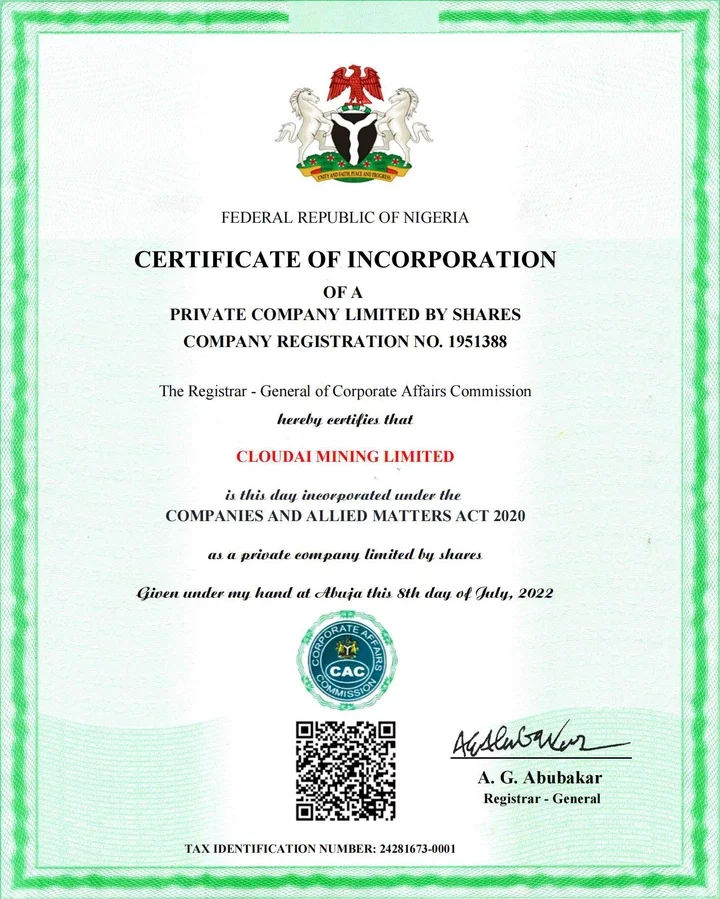As you embark on your entrepreneurial journey, you'll encounter various legal documents crucial to establishing your business. Among these, the Certificate of Incorporation stands out as a fundamental cornerstone. This official document, issued by your state government, formally recognizes your company as a legal entity. It serves as your business's birth certificate, granting it a separate identity from its owners.
Understanding the purpose and significance of this certificate is essential for any aspiring business owner. In this article, we'll delve into the intricacies of the Certificate of Incorporation, exploring its components, benefits, and the process of obtaining one for your new venture.
What is a Certificate of Incorporation?

A Certificate of Incorporation is a vital legal document that officially establishes a corporation's existence. This crucial paperwork, issued by a state government, serves as the corporation's birth certificate, granting it legal recognition and the ability to conduct business.
The Certificate of Incorporation typically includes:
Corporation name
Business purpose
Registered agent information
Number and types of authorized shares
Names and addresses of incorporators
This document is more than just a formality. It:
Confirms the corporation's compliance with state laws
Protects shareholders from personal liability
Enables the company to enter contracts and own property
Once approved, the state issues the Certificate of Incorporation, marking the official birth of the corporation. This document is crucial for opening bank accounts, securing loans, and demonstrating the company's legitimacy to potential investors and partners.
Remember, while the Certificate of Incorporation is a foundational document, it's just the beginning of a corporation's legal journey. Ongoing compliance and proper record-keeping are essential for maintaining the company's good standing and legal protections.
Why Do You Need a Certificate of Incorporation?
A Certificate of Incorporation is more than just a piece of paper; it's a crucial document that serves multiple important purposes for your business. Here's why you need one:
Legal Recognition and Protection
Obtaining a Certificate of Incorporation officially establishes your company as a separate legal entity. This distinction is vital as it protects your personal assets from business liabilities. Should your company face legal issues or debts, your personal property remains safeguarded.
Credibility and Trust
A Certificate of Incorporation lends credibility to your business. It demonstrates to potential clients, partners, and investors that you've completed the necessary legal steps to establish a legitimate enterprise. This official recognition can significantly boost your company's reputation and trustworthiness in the marketplace.
Access to Funding and Resources
Many financial institutions and investors require a Certificate of Incorporation before considering your business for loans or investments. This document serves as proof of your company's legal status and can open doors to crucial funding opportunities. Additionally, it may be necessary for securing business licenses, permits, or even opening a business bank account.
Perpetual Existence
Your Certificate of Incorporation ensures your company's continuity, even if ownership changes. This "perpetual existence" feature is particularly valuable for attracting investors and planning for long-term growth and succession.
How to Obtain a Certificate of Incorporation in Nigeria
The Corporate Affairs Commission (CAC) plays a pivotal role in Nigeria's business landscape. As the government agency responsible for regulating the formation and management of companies, the CAC serves as the gateway for entrepreneurs and corporations alike. The CAC has modernized its operations, offering online services to streamline these procedures and enhance efficiency.
When incorporating a company, you'll interact with the CAC throughout the registration process. This typically involves:
Step 1: Reserve Your Company Name
Begin by reserving your desired company name with the Corporate Affairs Commission (CAC). This step ensures your chosen name is available and prevents duplicates. Submit your application online or in person at a CAC office, paying the required fee. The reservation is valid for 60 days.
Step 2: Prepare Required Documents
Gather all necessary documents, including:
Memorandum and Articles of Association
Statement of share capital
Particulars of directors and shareholders
Declaration of compliance
Proof of registered office address
Step 3: Submit the Application and Pay the Fees
File your application with the CAC, either online or at their office. Pay the prescribed incorporation fees, which vary based on your company's share capital. The CAC will review your application and documents for completeness and compliance.
Step 4: Obtain Certificate of Incorporation
Once approved, the CAC will issue your Certificate of Incorporation. This document officially recognizes your company as a legal entity in Nigeria. You can collect it in person or have it delivered to your registered address. With this certificate, you can now commence business operations legally.
What Information is Included in the Certificate of Incorporation?
A Certificate of Incorporation typically contains essential details about a company's formation and structure. Here are nine key pieces of information you'll commonly find in this important document:
Company Identification
Company Name: The official registered name of the corporation.
Registered Office Address: The official address where the company can receive legal notices and correspondence.
Corporate Structure
Purpose Statement: A brief description of the company's primary business activities.
Share Structure: Details about the types and number of shares the company is authorized to issue.
Names and Addresses of Incorporators: Individuals responsible for forming the corporation.
Governance Information
Names of Initial Directors: The first board members who will oversee the company's operations.
Restrictions on Business Activities: Any limitations on what the company can or cannot do.
Legal Compliance
Incorporation Date: The official date when the company was legally formed.
Corporate Number: A unique identifier assigned by the state or jurisdiction.
Understanding these elements is crucial for anyone involved in corporate formation or management. Each piece of information serves a specific purpose in establishing the company's legal identity and operational framework.
When to Amend Your Certificate of Incorporation
Amending your Certificate of Incorporation is a crucial step in maintaining your company's legal compliance and adapting to changing business needs. You should consider amending this document in several key situations:
Changes in Corporate Structure
When your company undergoes significant structural changes, such as altering the number of authorized shares or creating new classes of stock, you'll need to amend your Certificate of Incorporation. This ensures that your legal documentation accurately reflects your current corporate structure.
Name Changes
If you decide to change your company's name, you must amend your Certificate of Incorporation to reflect this change. This step is essential for maintaining legal consistency and avoiding confusion in the marketplace.
Modifying Corporate Purpose
As your business evolves, you may find that your original stated purpose no longer accurately represents your company's activities. In such cases, amending your Certificate of Incorporation to update your corporate purpose is necessary to align with your current business operations.
Compliance with New Regulations
Sometimes, changes in state or federal laws may require you to update your Certificate of Incorporation. Staying informed about regulatory changes and amending your document accordingly helps ensure your company remains in good standing with relevant authorities.
Remember, any amendment to your Certificate of Incorporation typically requires board approval and, in many cases, shareholder consent. Always consult with a legal professional to navigate this process effectively and ensure compliance with all applicable laws and regulations.
Renewing Your Certificate of Incorporation in Nigeria
Step 1: Check Renewal Requirements
Before initiating the renewal process, verify your company's eligibility and gather the necessary documents. These typically include your original Certificate of Incorporation, proof of tax compliance, and updated company information.
Step 2: Complete Required Forms
Obtain and fill out the appropriate renewal forms from the Corporate Affairs Commission (CAC). Ensure all information is accurate and up-to-date, including company address, directors, and shareholding structure.
Step 3: Pay Renewal Fees
Submit the required renewal fees to the designated CAC account. Keep the payment receipt as proof of transaction, as you'll need it for the next steps.
Step 4: Submit Application
Present your completed forms, supporting documents, and payment receipt to the CAC office. You may also be able to submit these online through the CAC portal, depending on current regulations.
Step 5: Track and Collect
After submission, you'll receive a tracking number. Use this to monitor your application's progress. Once approved, collect your renewed Certificate of Incorporation from the CAC office or receive it via mail if you opt for delivery.
Remember, timely renewal is crucial to maintain your company's legal status and avoid penalties. Consider setting up reminders to ensure you don't miss future renewal deadlines.
Facts about Certificate of Incorporation in Nigeria
These are some facts about the Certificate of Incorporation in Nigeria:
Legal Recognition
A Certificate of Incorporation in Nigeria provides official recognition of a company's legal existence. It serves as concrete proof that the business is registered with the Corporate Affairs Commission (CAC) and is authorized to operate within the country.
Limited Liability Protection
This document grants shareholders protection from personal liability for the company's debts. It establishes the corporation as a separate legal entity, shielding individual owners from financial risks associated with the business.
Access to Funding
With a Certificate of Incorporation, Nigerian businesses gain credibility in the eyes of investors and lenders. This official status often opens doors to various funding opportunities, including bank loans and venture capital investments.
Perpetual Existence
The certificate ensures the company's continuity beyond the lifespan or involvement of its original founders. This perpetual existence allows for easier transfer of ownership and long-term business planning.
Tax Implications
Incorporated companies in Nigeria are subject to specific tax regulations. The certificate is crucial for obtaining a Tax Identification Number (TIN) and complying with corporate tax obligations set by the Federal Inland Revenue Service (FIRS).
Business Name Protection
Upon incorporation, the company's name becomes legally protected nationwide. This prevents other businesses from registering or operating under the same name, safeguarding the company's brand identity.
Mandatory for Certain Operations
In Nigeria, certain business activities, such as banking or insurance, require a Certificate of Incorporation by law. It's an essential prerequisite for obtaining specific licenses and permits in regulated industries.
Frequently Asked Questions
These are some frequently asked questions and answers about the Certificate of Incorporation.
What is the purpose of a Certificate of Incorporation?
A Certificate of Incorporation serves as official proof that a company has been legally registered with the state. It confirms the company's existence and provides essential details about its formation. This document is crucial for establishing the company's legal status, opening bank accounts, and conducting business operations.
Can I make changes to my Certificate of Incorporation after it's issued?
Yes, you can make changes to your Certificate of Incorporation after it's issued. This process is called "amending" the certificate. Common amendments include changing the company name, altering the number of authorized shares, or modifying the company's purpose. To make these changes, you'll need to file an Amendment to the Certificate of Incorporation with your state's Secretary of State office and pay the required fees.
Do I need a new certificate of incorporation if I change my company name?
Yes, you'll need to obtain a new certificate of incorporation if you change your company name. This process involves filing an amendment with the appropriate government agency and paying any required fees. The new certificate will reflect your updated company name while maintaining your original incorporation date.
When will I need to use the certificate of incorporation?
You'll typically need to present your certificate of incorporation when opening a business bank account, applying for loans, entering into contracts, or dealing with government agencies. It's also often required when seeking investors or selling your business. Keep your certificate in a safe place, as you may need it for various legal and financial transactions throughout your company's lifecycle.
Where and when do I get a certificate of incorporation in Nigeria?
In Nigeria, you obtain a certificate of incorporation from the Corporate Affairs Commission (CAC) after successfully registering your business. The process involves submitting required documents, paying necessary fees, and waiting for approval. Once approved, the CAC issues the certificate, typically within a few weeks of application submission.
How long does it take to obtain a Certificate of Incorporation?
The processing time for a Certificate of Incorporation varies by state and filing method. Typically, it can take anywhere from two to seven working days for standard processing. However, many states offer expedited services for an additional fee, which can reduce the processing time to as little as 24-48 hours.
Is a Certificate of Incorporation the same as Articles of Incorporation?
While often used interchangeably, there's a subtle difference. Articles of Incorporation are the documents you file to form your corporation, while the Certificate of Incorporation is the official document the state issues in response, confirming your company's legal formation.
Conclusion
The Certificate of Incorporation (COI) issued by the Corporate Affairs Commission (CAC) is a crucial document for businesses in Nigeria. This official certificate serves as legal proof of a company's existence and compliance with registration requirements. Understanding the CAC Certificate of Incorporation is essential for entrepreneurs and business owners in Nigeria, as it forms the foundation of a company's legal existence and operations.

















Comments